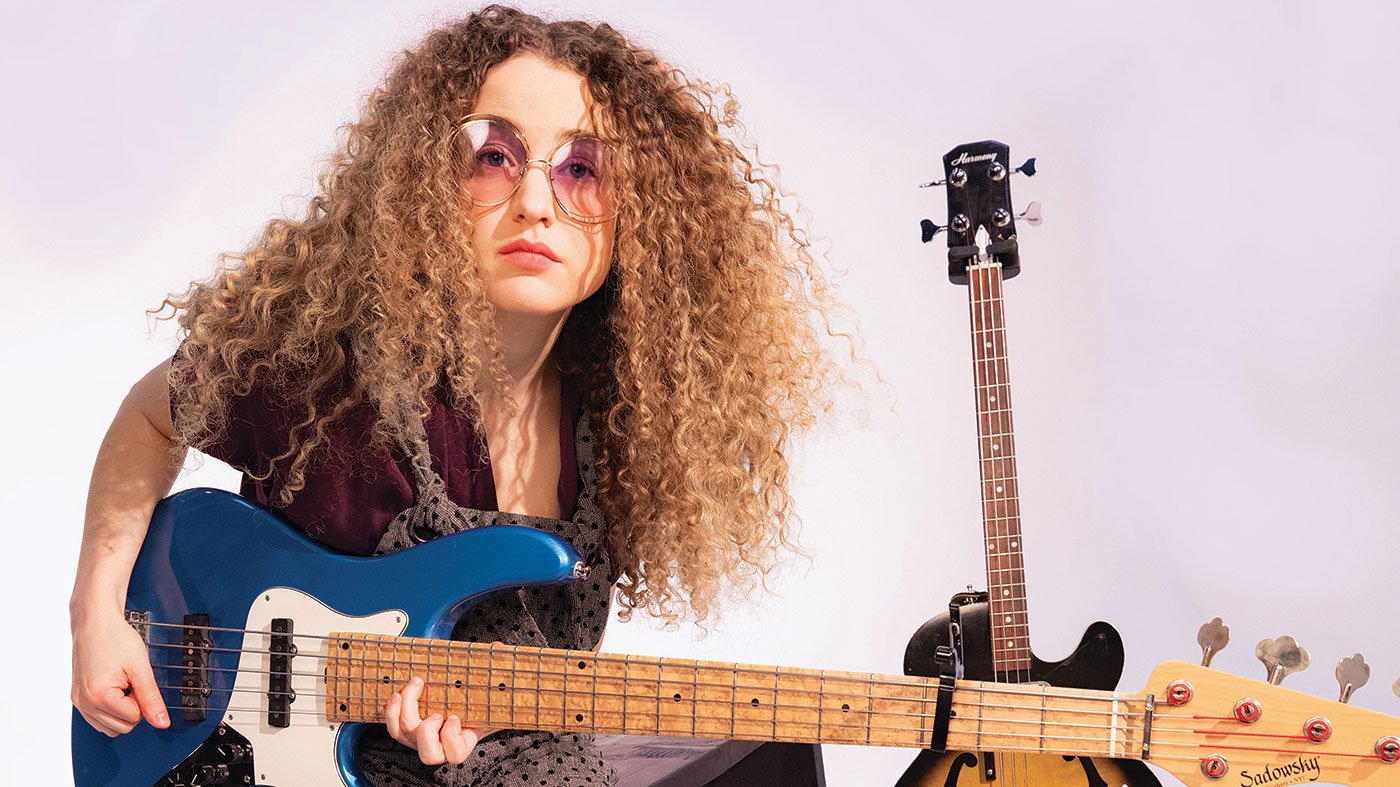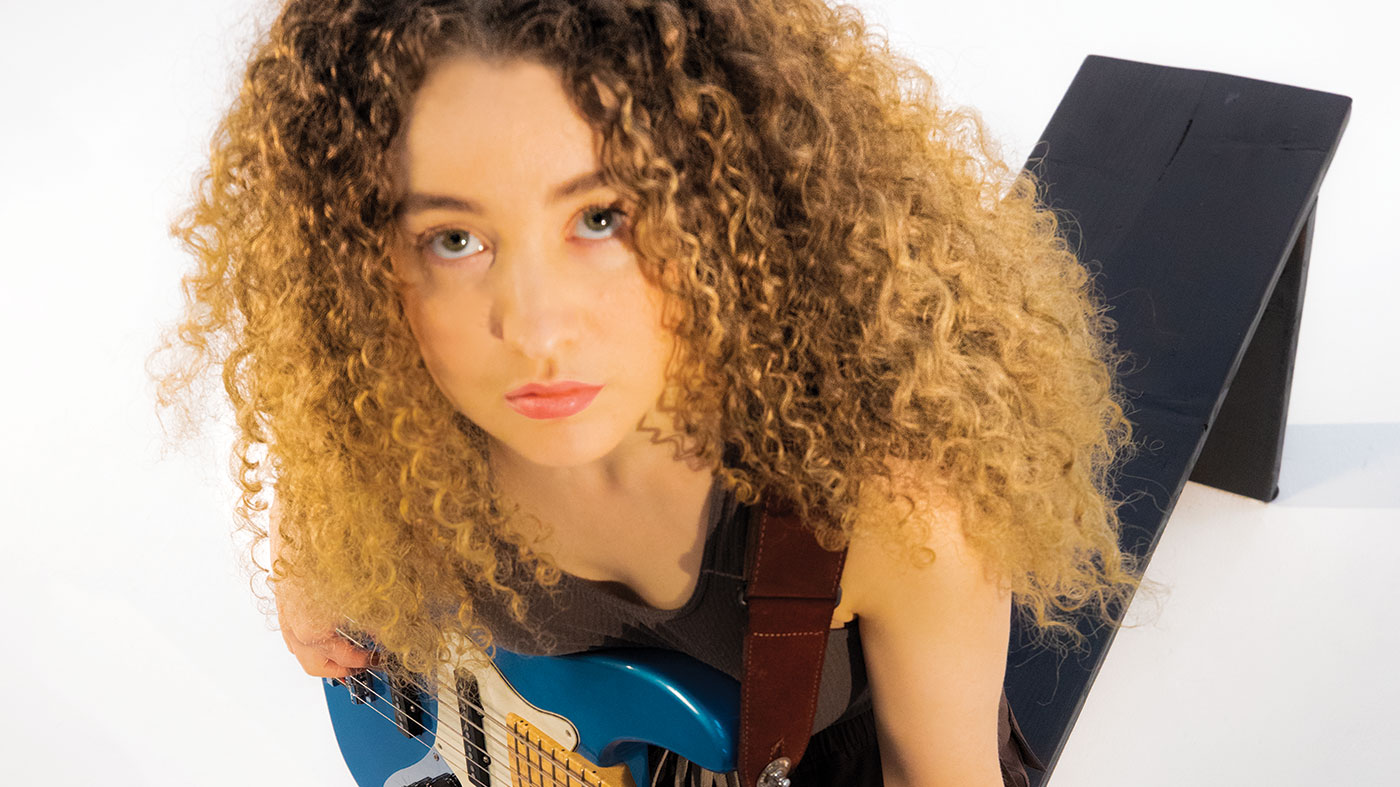Tal Wilkenfeld: “I’m a completely different bass player now. When I was in Jeff Beck’s band, I hadn’t even been playing for four years!”
The Australian bassist on Love Remains and her superstar collaborators

Tal Wilkenfeld’s 2007 debut album was titled Transformation, and although it was an instrumental record made with a handful of New York City’s top jazz musicians, the connotation seemed clear.
After all, here was a musician who moved from her native Bondi Beach, Australia to Los Angeles at 16 to pursue a career playing bass guitar, and within a handful of years she had become a YouTube-aided global sensation.
Wilkenfeld has been nothing short of a marvel as a bassist for hire with everyone from Chick Corea, Herbie Hancock, Toto and Prince to Mick Jagger
The flashpoint? A viral clip of her expressive solo on Cause We’ve Ended As Lovers, as a member of Jeff Beck’s quartet at Eric Clapton’s Crossroad Festival in 2007. Fast-forward a dozen years, and the album title seems to have revealed its true meaning at last.
For while Wilkenfeld has been nothing short of a marvel as a bassist for hire with everyone from Chick Corea, Herbie Hancock, Toto and Prince to Mick Jagger, Ringo Starr, Jackson Browne, Keith Urban and Ryan Adams, she has returned to her very first incarnation: singer-songwriter. Transformation indeed.
Love Remains, Wilkenfeld’s sophomore solo effort, is a stirring collection of 10 songs drawn largely from life experiences garnered during her time providing low-end in the limelight.
The framework is rock ’n’ roll, but this is no one-car garage creation. Along with guitarist Blake Mills, drummer Jeremy Stacey, keyboardists Benmont Tench and Zac Rae, and coproducer/ guitarist Paul Stacey, Wilkenfeld unveils a soundscape wide and warm.
Interlocked electric, acoustic and bass guitars conjure ambiguous harmonies and nuanced support parts that help her deliver her introspective lyrics in a voice that is sometimes delicate, sometimes dirty, but always direct from the heart.
Get the MusicRadar Newsletter
Want all the hottest music and gear news, reviews, deals, features and more, direct to your inbox? Sign up here.
A new path
Of her new path, she explains, “I was singing and writing songs from the first day I picked up a guitar at 14. When I moved to the States, my focus shifted to being strictly an instrumentalist. After a few years touring as a bassist, I realised I had abandoned my roots as a singersongwriter, and that’s when I started working on Love Remains.”
As I began recording my songs I would ask Jackson Browne for advice, and he was beyond helpful
With her new mission in place and her schedule cleared to be home in Los Angeles writing, Wilkenfeld found the perfect mentor in Jackson Browne. She recalls, “I met Jackson while performing with Jeff Beck at the Rock And Roll Hall Of Fame 25th Anniversary at Madison Square Garden.
As I began recording my songs I would ask him for advice, and he was beyond helpful, taking the time to share his wisdom and knowledge. I feel very fortunate to have him as a friend.” As a result, Jackson is credited as Executive Producer on Love Remains, having overseen the record’s process.
Wilkenfeld cites Browne as more than just a major songwriting influence. “A lot of the artists who inspired me were ones I was introduced to during the making of the album, and that was thanks to Jackson and Benmont, who I’d met through Jackson.
“When they realised that I didn’t grow up hearing artists like Bob Dylan, The Rolling Stones or Neil Young, they made sure to educate me. That affected how the album developed, and they became some of my favourite songwriters, along with Elliott Smith and Paul Simon. All of these artists were influencing my writing in real time, along with artists whose inspiration I’d already drawn from, like Leonard Cohen and Jimi Hendrix.”
She adds: “It was very helpful to have Paul Stacey working on this with me, because he’s musically diverse and I trust his taste and experience. He offered a lot of great ideas, and even when we disagreed about certain things, he took a stance when he believed it was right for the music.
“It’s important to work with a producer that isn’t just a ‘yes’ person. Tony Berg [credited with additional production on Counterfeit] was also very insightful and supportive throughout the making of the album. I don’t think I’ve ever walked away from a conversation with him without learning something new.”
Still, any record needs a spark as a launching point, and for Wilkenfeld it was the album’s first single, Corner Painter. She explains: “I kept writing with the intention of finding a song that would become the linchpin for the rest of the album. When I wrote ‘Corner Painter’ and recorded it with the Stacey brothers and Blake Mills, I knew I had landed upon the sound - both compositionally and sonically - that I wanted the rest of the songs to stand alongside.”

Cornered
I’m a completely different bass player now than I was 10 years ago
It was a culinary catalyst that brought the album’s ensemble together. She chuckles, “I’ve met so many key people in my life through my love of sushi! I made plans to have sushi with Benmont. He invited Jeremy, who I’d met briefly at Eric Clapton’s Crossroads festival, and halfway through the dinner, Paul showed up.
“After dinner, we went to my car and I played them some songs I was working on. They really connected with them, and I liked what they had to say about how they’d approach my music, so we made plans to try out a couple of songs in the studio. I suggested we call Blake Mills, who’s one of the most inventive, musical guitarists I know, and the four of us cut Corner Painter. A few months later, while having sushi with Benmont at the same place, I met Zac Rae, who joined us when we cut the rest of the album.”
Meanwhile, the transition to singer-songwriter had an effect on Wilkenfeld’s bass playing. “I’m a completely different bass player now than I was 10 years ago. When I was in Jeff Beck’s band, I hadn’t even been playing for four years!” she tells us.
“It’s a really exciting time when you pick up an instrument and start discovering your voice on it. Sometimes that can be a distraction from the discipline of when to step forward or when to step back. The more experience you get, the more your playing becomes less about your voice and more about the song. I’m backing up a singer, and that singer is me! Doing that regularly reinforced how to play the appropriate part for the song.”
Tal’s bass on Love Remains pivots between dual roles. There’s the solid, song-minded support, as on the fiery Hard To Be Alone, the stadium rocker Killing Me and the forlorn ballad Pieces Of Me.
In contrast, her bass engages in call and response with her vocal on the dreamy, reflective Counterfeit and the strident Fistful Of Glass. She reveals, “Most of the album, including Counterfeit, was recorded live, so aside from some written parts, the bass playing is a spontaneous reaction to my singing. For Fistful Of Glass I overdubbed the bass and used a pick, but I retained a call and response approach.”
The album’s crown jewel may well be Haunted Love, a bass and vocal ballad. Wilkenfeld took her Sadowsky NYC five-string, strung it E-A-D-G-C, added a capo at the third fret, and accompanied herself fingerstyle via chords and arpeggios comprising close voicings and open strings.
Her fans got a preview of this unique approach when she performed Leonard Cohen’s Chelsea Hotel at Bass Player LIVE! 2013, where she was presented with BP’s Young Gun award.
She reports, “Haunted Love came to me all at once - melody, chords and lyrics - and then I refined the various aspects. I approach it like I’m accompanying myself on a baritone nylon-string acoustic guitar. It’s very satisfying to play because I get to sing on both of my instruments.”
Harmony lines
Sometimes the most inventive ideas on an instrument come from someone who doesn’t primarily play that instrument
Elsewhere, Wilkenfeld played an early-60s Harmony H22 hollowbody bass on Under The Sun, which features her freely phrased bass melody at the start and end.
She says, “I wrote that song with Sonya Kitchell, and I grabbed a Harmony bass that was hanging on her wall. That bass defined the sound of the song, so I went out and bought one. Sometimes an instrument can inspire the creation or development of a song and in turn become a key part of its sound. It’s nice to maintain that authenticity when recording it. That’s why Jackson Browne has 15 guitars on stage!”
For the bulk of the album, Wilkenfeld turned to a Fender Precision belonging to Browne.
She explains, “Early on we established a sound for the record; I don’t want to call it vintage or retro, but it was definitely warm and analogue. We didn’t want the album to sound like 1970 or 2019, we aimed to make it sound as if it could have been recorded at any time.”
She continues: “Passive instruments like the P-Bass and the Harmony work well in that setting. Modern basses have more of a hi-fi sound, which works great in other situations, but it wasn’t right for what we were trying to accomplish. On Haunted Love, to make my Sadowsky complement the sound of the rest of the album, I used flatwound strings, rolled the tone all the way down, and recorded it through a guitar amp.”
Bass notes come from diverse sources on the album. One Thing After Another uses a woodwind ensemble with bass clarinet on the bottom for a different colour. Corner Painter was recorded on a baritone acoustic guitar, coupled with Blake Mills’ tuned-down electric guitar.
Wilkenfeld explains: “I overdubbed some root notes on an organ to fatten up the bottom, but there was enough going on musically between the core trio of Blake, Jeremy and I that we didn’t need to pull focus from that with an electric bass-line.”
Mills strapped on a Precision bass with flatwounds for the title track. “When we were recording, Blake tried a few different approaches on electric guitar and it all felt like too much on top of an already pretty complex song, so I suggested he play bass. He came up with a very interesting, musical bassline that I would have never thought to play. Sometimes the most inventive ideas on an instrument come from someone who doesn’t primarily play that instrument.”

Coming home
Looking back at Wilkenfeld’s career, bass has served as the through line. Although she arrived at the Los Angeles Music Academy to study guitar, she switched to bass in her second semester.
She smiles: “People would catch me plucking funky grooves on my guitar. If I saw a bass I wanted to play it. Same with drums. It was obvious to everyone that I wanted to be a rhythm section player. I was hesitant to switch, getting such a late start at 17, but once I picked up the bass it felt very natural to me - like it was home.”
Wilkenfeld credits Marcus Miller with being the first bassist to sit down with her and offer his guidance. Soon after, she was drawn to New York City by Wayne Krantz’s albums Long To Be Loose and 2 Drink Minimum (both from 1995), which featured the rhythm team of bassist Lincoln Goines and drummer Zach Danziger. Once there, her in-person tutelage continued via Anthony Jackson and Oteil Burbridge.
Prince recorded to tape and worked very quickly, and he never wanted to punch in unless it was absolutely necessary
She admits: “When I got to New York, people told me I sounded like Jaco, and I said ‘Who’s Jaco?’ So I dug into his solo records and his work with Weather Report and Joni Mitchell.”
Pausing to reflect on her peers, she adds “There are so many great bass players out there. I get inspired by the ones who have a solid groove and create a bassline that is just as melodic as the top line. James Jamerson is the king of that.”
Word of the ‘Wonder From Down Under’ soon spread, leading Wilkenfeld to play with Krantz, Hiram Bullock and Jeff ‘Tain’ Watts, and sit in with the Allman Brothers and Susan Tedeschi. Her aforementioned debut album, Transformation, resulted in tours with Chick Corea and, of course, her breakout role with Jeff Beck. Online and TV appearances with Beck led to touring and recording with Herbie Hancock and studio time with Prince.
Reflecting on those post-album experiences, she relates: “They were all highly inspirational people to be around. Prince recorded to tape and worked very quickly, and he never wanted to punch in unless it was absolutely necessary. That taught me how to work fast and effectively, and commit to my decisions.
“Playing in Jeff Beck’s and Herbie Hancock’s bands was so fun, because it was never about playing for the sake of playing; it was about having diverse musical conversations with notes. When you approach music from that place, everyone has something to say, and something to learn from a conversation. There’s no way you can walk away from situations like that without picking up on some of the nuances and the subtleties they bring to the music. I’m one lucky human!”
While Wilkenfeld’s Beck association led to performances alongside such rock royalty as Mick Jagger, Jimmy Page, Ringo Starr, Buddy Guy, Joe Walsh, Steven Tyler, Sting and Billy Gibbons, it was a brief meeting with Pete Townshend in 2014 that resulted in her opening for The Who.
She explains: “Right after I recorded my album, I sent it to Pete and his reaction was very encouraging and supportive. As it turned out, the opening band for The Who’s upcoming tour were having visa issues, so it was a case of very fortunate timing.”
She adds: “It was an invaluable experience. Other than a few club shows, I’d never sung a whole set of my music before. I learned how to build a set that keeps the audience engaged, and I built up the stamina to perform it. I also learned how to simplify the music in order to reach the people in the very back rows of stadiums.”
If I can enhance a project with something that I can contribute creatively, I’m in
As 2019 unfolds, Wilkenfeld will focus on Love Remains. Having performed well-received album launch shows in Los Angeles and New York, she will continue to tour in 2019.
Of the title, she explains: “The combination of the two words ‘Love’ and ‘Remains’ has two very different meanings, both present in the themes of the record: the endurance or the failure of love.”
That duality also applies to Tal’s career, as she evolves from being known simply as a prodigious bassist to a singer-songwriter, composer and producer too.
She has no plans to abandon her role as an in-demand session player, producer or side musician.
“I love collaboration,” she says. “If I can enhance a project with something that I can contribute creatively, I’m in. Ultimately, I’ll listen to what my heart tells me to pursue, as I’ve always done, and follow the inspiration.”


“Every note counts and fits perfectly”: Kirk Hammett names his best Metallica solo – and no, it’s not One or Master Of Puppets
“I can write anything... Just tell me what you want. You want death metal in C? Okay, here it is. A little country and western? Reggae, blues, whatever”: Yngwie Malmsteen on classical epiphanies, modern art and why he embraces the cliff edge









